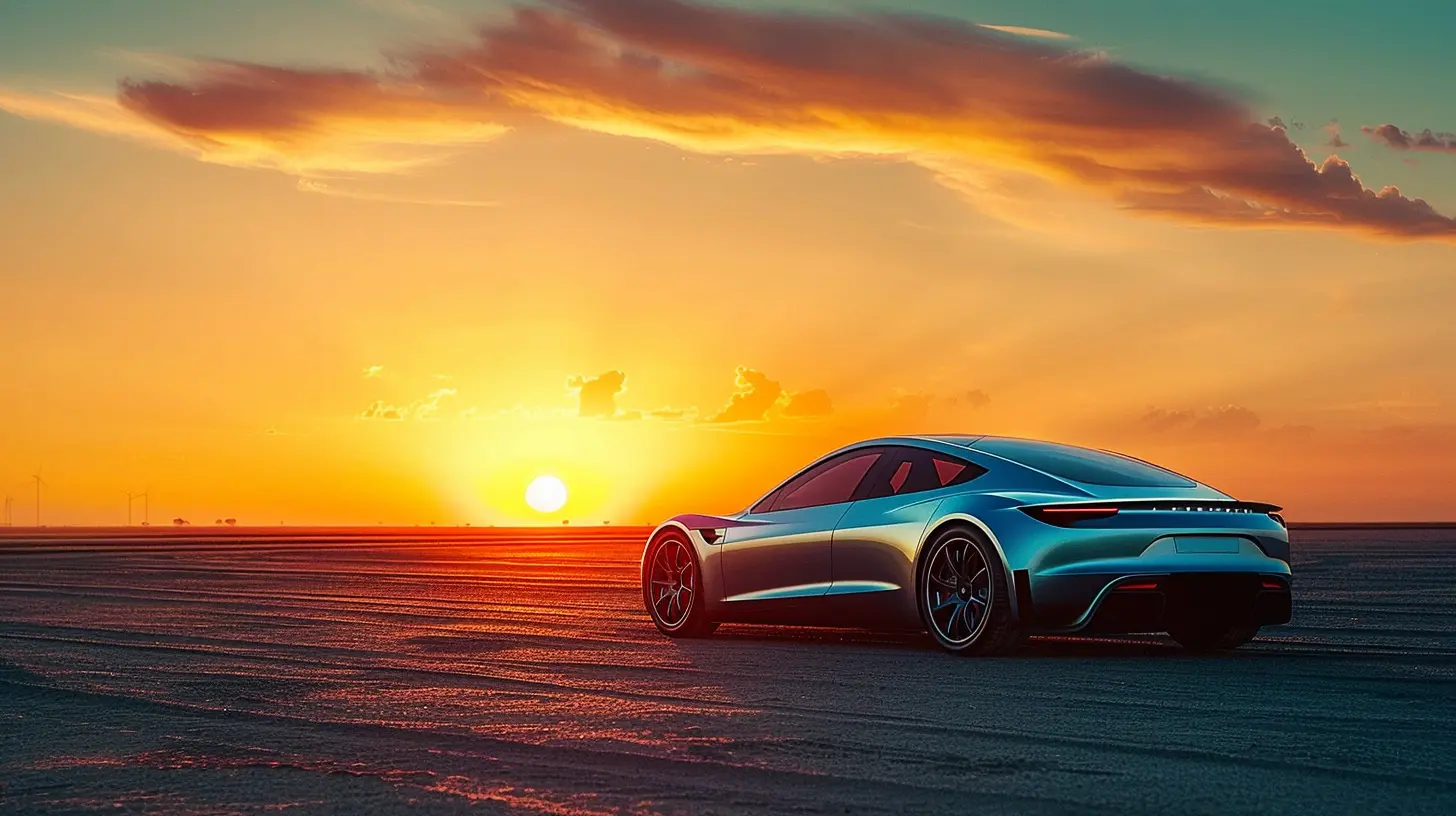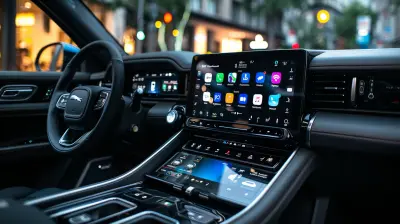13 December 2024

Introduction
Have you ever imagined cruising down the highway in a car powered by nothing but sunlight? It sounds like something out of a sci-fi movie, right? But the truth is, solar-powered electric vehicles (EVs) are not just a futuristic dream; they’re a reality that’s slowly gaining traction. With the world moving towards greener and more sustainable energy solutions, the idea of combining solar power with electric vehicles is an exciting innovation.But, how realistic is this? Can we really depend on the sun to take us from point A to point B? Let’s dive deep into the potential of solar-powered electric vehicles (SPEVs) and see what the future holds.
What Are Solar-Powered Electric Vehicles?
So, let’s break it down. What exactly are solar-powered electric vehicles?At their core, SPEVs are EVs equipped with solar panels, usually placed on the roof or integrated into the body of the car. These panels are designed to capture sunlight and convert it into electricity, which is then stored in the car’s battery. The electricity generated by the solar panels either powers the car directly or supplements the energy the car’s battery already has. This means that, in theory, you could drive for miles without needing to plug into an external power source.
But here’s the thing: solar panels alone aren't enough to power a car entirely. They usually work in tandem with traditional charging methods. Still, even if solar power can’t fully replace battery charging, it can significantly extend the vehicle's range and reduce the frequency of charging stops.
The Science Behind Solar-Powered Electric Vehicles
Okay, now that we know what SPEVs are, let’s get a bit technical for a second. How do they work?1. Solar Panels
Solar panels are made up of photovoltaic (PV) cells. These cells capture sunlight, which is a form of energy, and convert it into direct current (DC) electricity.2. Inverter
Since electric vehicles run on alternating current (AC) electricity, an inverter is used to convert the DC electricity from the solar panels into usable AC power.3. Battery
Once converted, the electricity is either used immediately to power the vehicle or stored in the car's battery for later use. This is particularly useful for cloudy days or nighttime driving when sunlight isn’t available.4. Motor
The electric motor then takes the stored energy from the battery and uses it to propel the car forward.It’s a pretty seamless process, but there’s a catch: the efficiency of solar panels isn’t 100%. Most current PV cells convert only about 15-20% of the sunlight they capture into usable energy. So while the idea of a fully solar-powered car sounds awesome, we’re not quite there yet in terms of efficiency.
The Benefits of Solar-Powered Electric Vehicles
Now that we understand how they work, let’s talk about why this matters. Why should we care about solar-powered EVs in the first place? Here are some of the key benefits:1. Reduced Carbon Footprint
We all know EVs are already a great way to reduce your carbon footprint compared to gas-powered cars. But adding solar power into the mix takes it one step further. By utilizing solar energy, you’re reducing your reliance on electricity from the grid, which, depending on where you live, could come from non-renewable sources like coal or natural gas.2. Lower Operating Costs
Let’s face it, charging an electric vehicle can still be costly, especially if you’re using a fast charger. With solar panels on your car, you can generate some, if not all, of the energy you need directly from the sun. That’s free energy, folks! Over time, this could significantly reduce your fuel costs.3. Extended Range
One of the most common concerns among EV drivers is range anxiety—the fear of running out of battery without access to a charging station. Solar-powered EVs can help alleviate this fear by topping off your battery while you drive or park in the sun. It’s like having a little extra juice on standby for those long road trips.4. Independence from the Grid
Imagine not having to rely on the local power grid to charge your car. In areas where electricity is scarce or unreliable, solar-powered EVs could provide a level of independence that’s hard to beat.The Challenges of Solar-Powered Electric Vehicles
As awesome as they sound, solar-powered EVs aren’t without their challenges. Let’s take a look at some of the hurdles that need to be overcome before they become mainstream.1. Limited Energy Production
This is the big one. The amount of energy solar panels can generate is directly related to their surface area and the amount of sunlight they receive. Since cars have limited space for solar panels, they can only generate so much electricity. Plus, if you live in a cloudy or rainy region, or if you frequently park in a garage, your car’s solar panels won’t be as effective.2. Efficiency Issues
As mentioned earlier, current solar panel technology isn’t super-efficient. Most solar panels are only able to convert around 15-20% of the sunlight they receive into energy. This means that while solar power can supplement your EV’s battery, it’s unlikely to fully replace the need for traditional charging in the near future.3. Cost
While the price of solar panels has come down in recent years, integrating them into vehicles still adds to the overall cost of the car. This could make solar-powered EVs more expensive upfront compared to traditional EVs, which are already pricier than gas-powered cars.4. Durability and Maintenance
Solar panels are designed to be durable, but they do require maintenance. Dust, dirt, and debris can reduce their efficiency, and damage to the panels could be costly to repair. Since they’re typically mounted on the roof of the car, they’re also exposed to more wear and tear than the panels you’d find on a rooftop.Solar-Powered EVs on the Market
Believe it or not, there are already a few solar-powered electric vehicles either on the market or in development. Let’s take a quick look at some of the key players.1. Lightyear One
The Lightyear One is one of the most promising solar-powered EVs in development. With its sleek design and roof-mounted solar panels, it’s built to maximize efficiency. The company claims the car can drive up to 450 miles on a single charge, with an extra 30 miles per day coming from solar power alone. It’s not cheap, though—the initial price tag is expected to be over $150,000.2. Sono Motors Sion
Sono Motors, a German startup, is working on the Sion, a more affordable solar-powered EV. The Sion comes with solar panels integrated into its body and is expected to add up to 21 miles of range per day through solar power. The car is expected to be priced around $25,000, making it a more accessible option for the average consumer.3. Aptera
Aptera is another company diving into the solar-powered EV market. Their three-wheeled, ultra-efficient vehicle claims to offer up to 40 miles of range per day from solar power alone, with a total range of over 1,000 miles on a full charge. It’s futuristic both in design and performance.The Future of Solar-Powered Electric Vehicles
So, where does this leave us? Are solar-powered electric vehicles the future of transportation?1. Technological Advancements
As solar technology continues to improve, it’s likely we’ll see more efficient solar panels that can generate more energy in less space. This could make solar-powered EVs more practical for everyday use. Advances in battery technology will also play a key role in making these vehicles more viable.2. Widespread Adoption
While it’s unlikely that solar-powered EVs will completely replace traditional EVs anytime soon, they could become a popular option in sunny regions where solar energy is abundant. Imagine living in a place like California or Arizona, where your car could charge itself just by sitting in your driveway!3. Environmental Impact
As the world continues to focus on reducing carbon emissions, the combination of solar power and electric vehicles could be a game-changer. By harnessing the power of the sun, we could drastically reduce our reliance on fossil fuels and move towards a more sustainable, eco-friendly future.Conclusion
While solar-powered electric vehicles are still in their early stages, the potential they hold is enormous. They offer a glimpse into a future where our cars are powered by clean, renewable energy, reducing our dependence on fossil fuels and cutting down on emissions.Sure, there are challenges to overcome—solar panels need to become more efficient, and the cost of production needs to come down—but the prospects are exciting. As technology continues to improve and the world becomes more eco-conscious, it’s safe to say that solar-powered EVs will play an important role in the future of transportation.
So, next time you’re stuck in traffic, take a moment to look up at the sun—and imagine a world where it’s fueling your ride.













Dahlia McAnally
This article beautifully highlights the promising synergy between solar power and electric vehicles. It's inspiring to see sustainable technologies paving the way for a cleaner, greener future for all. Thank you for sharing!
March 28, 2025 at 1:06 PM